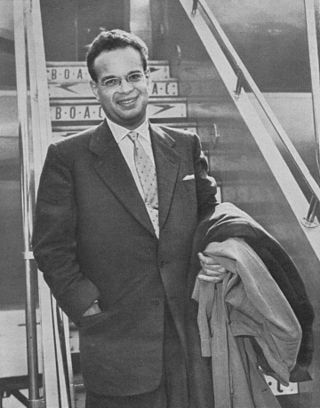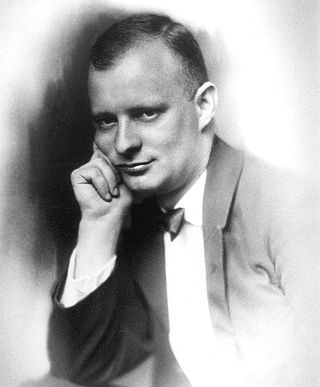Related Research Articles

Edward Benjamin Britten, Baron Britten was an English composer, conductor, and pianist. He was a central figure of 20th-century British music, with a range of works including opera, other vocal music, orchestral and chamber pieces. His best-known works include the opera Peter Grimes (1945), the War Requiem (1962) and the orchestral showpiece The Young Person's Guide to the Orchestra (1945).

The War Requiem, Op. 66, is a choral and orchestral composition by Benjamin Britten, composed mostly in 1961 and completed in January 1962. The War Requiem was performed for the consecration of the new Coventry Cathedral, in the English county of Warwickshire, which was built after the original fourteenth-century structure was destroyed in a World War II bombing raid. The traditional Latin texts are interspersed, in telling juxtaposition, with extra-liturgical poems by Wilfred Owen, written during World War I.

István Kertész was a Hungarian orchestral and operatic conductor who throughout his brief career led many of the world's great orchestras, including the Cleveland, Chicago, Philadelphia, New York, Los Angeles, Pittsburgh, Detroit, San Francisco and Minnesota Orchestras in the United States, as well as the London Symphony, Vienna Philharmonic, Berlin Philharmonic, Royal Concertgebouw Orchestra, Israel Philharmonic, and L'Orchestre de la Suisse Romande. His orchestral repertoire numbered over 450 works from all periods, and was matched by a repertoire of some sixty operas ranging from Mozart, Verdi, Puccini and Wagner to the more contemporary Prokofiev, Bartók, Britten, Kodály, Poulenc and Janáček. Kertész was part of a musical tradition that produced fellow Hungarian conductors Fritz Reiner, Antal Doráti, János Ferencsik, Eugene Ormandy, George Szell, János Fürst, Peter Erős, Ferenc Fricsay, and Georg Solti.

Frank Bridge was an English composer, violist and conductor.

Leon Fleisher was an American classical pianist, conductor and pedagogue. He was one of the most renowned pianists and pedagogues in the world. Music correspondent Elijah Ho called him "one of the most refined and transcendent musicians the United States has ever produced".

Julius Katchen was an American concert pianist, possibly best known for his recordings of Johannes Brahms's solo piano works.

Spring Symphony is a choral symphony by Benjamin Britten, his Opus 44. The work is scored for soprano, alto and tenor soloists, mixed choir, boys' choir and orchestra. Britten used texts of several poems related to spring, mostly from the 16th and 17th centuries and also one by W. H. Auden. Britten dedicated the work to Serge Koussevitzky and the Boston Symphony Orchestra. The work received its premiere in the Concertgebouw, Amsterdam on 14 July 1949 as part of the Holland Festival
The cultural year was dominated by the Festival of Britain and the opening of The Royal Festival Hall, the first dedicated concert hall of its size to be built in London since 1893: located on the south bank of the Thames, this was to host concerts by major orchestras from Britain and abroad. The Festival itself was a celebration of music, art and theatre. It notably provided an opportunity for the staging of many events seen during the first Folk music Festival held in Edinburgh, organised with the help of such talents as the American Alan Lomax, the Irish traditional musician Seamus Ennis and the political theatre director Ewan MacColl, who would go on to form the Ballad and Blues Club.
Cello Concerto in E minor, Op. 58 is a concerto written by Sergey Prokofiev between 1933 and 1938. Its duration is approximately 35 minutes. It consists of three movements:
- Andante – Poco meno mosso – Adagio
- Allegro giusto
- Tema (allegro) – Interludio 1 – Variations 1–3 – Interludio 2 – Variation 4 – Reminiscenza – Coda – Più mosso
Olli Mustonen is a Finnish pianist, conductor, and composer.
The CBC Symphony Orchestra was a radio orchestra based in Toronto, Ontario, Canada. It was operated by the Canadian Broadcasting Corporation during the 1950s and 1960s.

Arthur William Oldham OBE was an English composer and choirmaster. He founded the Edinburgh Festival Chorus in 1965, the Chorus of the Orchestre de Paris in 1975, and the Concertgebouw Orchestra Chorus in Amsterdam in 1979. He also worked with the Scottish Opera Chorus 1966–74 and directed the London Symphony Chorus 1969–76. For his work with the LSO Chorus, he won three Grammy Awards. He was also a composer, mainly of religious works, but also a ballet and an opera.

Siegfried Rapp was a German pianist who lost his right arm during World War II and then focused on the left-hand repertoire. He is now mainly remembered for being the first to perform Prokofiev's Piano Concerto No. 4 for the Left Hand, Op. 53.
This is a summary of 1950 in music in the United Kingdom.
This is a summary of 1949 in music in the United Kingdom.
Lorin Hollander is an American classical concert pianist. He has performed with virtually all of the major symphony orchestras in the United States and many around the world. A New York Times critic called him in 1964 "the leading pianist of his generation."
This is a summary of 1943 in music in the United Kingdom.
This is a summary of 1940 in music in the United Kingdom.
Trevor Harvey (1911—1989) was an English conductor.

Klaviermusik mit Orchester, Op. 29, is a 1923 piano concerto by Paul Hindemith. Subtitled Klavier nur linke Hand, it is a piano concerto for the left hand alone. It was commissioned by the pianist Paul Wittgenstein, who lost his right arm in the World War. He never played the piece, and when he died, his widow refused access to the score. The premiere, after her death, was played in Berlin in 2004, with Leon Fleisher as the soloist and the Berlin Philharmonic conducted by Simon Rattle. It was published by Schott.
References
- ↑ Mitchell, Donald; Reed, Philip, eds. (1991). Letters from a Life: Selected Letters and Diaries of Benjamin Britten, Vol 2, 1939–45. London: Faber and Faber. pp. 956–57. ISBN 0-571-16058-1.
- ↑ Waugh, Alexander (2009). The House of Wittgenstein, New York: Doubleday, pp. 279, 292
- ↑ Thackeray, Ruth (1978). "Music in London: Orchestral". The Musical Times. 119 (1629). The Musical Times, Vol. 119, No. 1629: 975–977. doi:10.2307/960161. JSTOR 960161.
- ↑ Robinson, Suzanne (1997). "'An English Composer Sees America': Benjamin Britten and the North American Press, 1939–42". American Music. 15 (3). American Music, Vol. 15, No. 3: 321–351. doi:10.2307/3052328. JSTOR 3052328.
- ↑ Robert Matthew-Walker: Notes to Hyperion CD CDA67625 (2008)
- ↑ Salter, Lionel (1994). "Book Reviews". The Musical Times. 119 (2): 268–297. JSTOR 964627.
- ↑ Henderson, Lyn (January 1987). "His Influence on Britten: The Vital Prokofiev". The Musical Times. 128 (1727): 24–25. doi:10.2307/1004703. JSTOR 1004703.
- ↑ Mark, Christopher (1994). "Britten and the Circle of Fifths". Journal of the Royal Musical Association. 119 (2): 268–297. doi:10.1093/jrma/119.2.268. JSTOR 766522.
- ↑ Thomson, Eric (1955). "Record Guide". Tempo. New Series. 36 (36): 35. ISSN 0040-2982. JSTOR 944035.
Sources
- Mitchell, Donald; Reed, Philip, eds. (1991). Letters from a Life: Selected Letters and Diaries of Benjamin Britten, Vol 2, 1939–45. London: Faber and Faber. ISBN 0-571-16058-1.